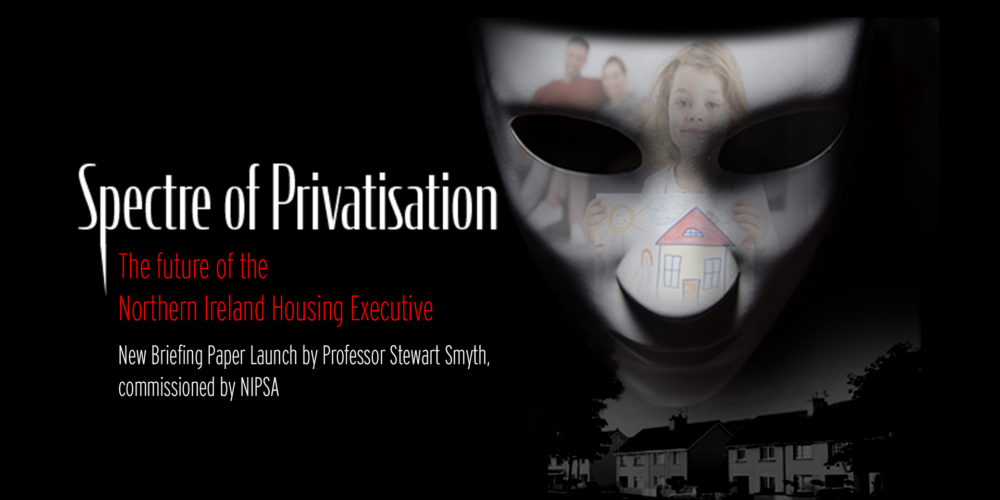A major victory for the civil rights struggle in Northern Ireland was the removal of public housing from sectarian control through the creation of the Northern Ireland Housing Executive. The NIHE built up a reputation for building some of the best public housing in western Europe, and developing progressive engagement with its tenants.
In 2009 the Chartered Institute of Housing reported in its “Independent Commission on the Future of Housing in NI” that “the presence of this highly significant player greatly enhances Northern Ireland’s capacity to tackle the housing issues faced here.” Even the management consultancy firm Price Waterhouse Cooper had to concede in 2011 that public housing is sustainable and of high quality.
However, like so many of the gains won by working people, public housing has been consistently undermined. Not content with decimating the public housing stock through selling off publicly financed housing in the 1980s, the NIHE has been further marginalised over the last decade as thousands of its properties have been transferred to housing associations. This hollowing out of the public sector is an ideological commitment to private-sector solutions, increasingly seen as the “only game in town.”
As was made clear at the recent 26th Congress of the CPI, “the drive to privatise, facilitated and promoted by national governments, and the outsourcing of public services are carried out in order to secure the dominance of private capital and to open up new avenues for speculative capital investment, resulting in the transfer of public resources to private or corporate interests” (CPI political resolution, paragraph 8).
In November 2020 the Sinn Féin minister Carál Ní Chuilín announced her plan to “change the classification of the Housing Executive landlord to a ‘mutual’ or co-operative,” meaning it would be considered a private-sector organisation for the sake of UK borrowing rules. But, as pointed out by the Northern Ireland Public Service Alliance—a leading public-sector trade union—in a report earlier this year titled “Spectre of Privatisation: The Future of the NIHE,” this proposal amounts to “privatisation in a fancy wrapper.”
Experiences in England demonstrate the influence that private finance capital increasingly has over these housing mutuals. To pursue a high credit rating they seek to increase incomes by raising rents and to decrease expenses by making cuts to services.¹
In March 2021 a new minister for communities, Deirdre Hargey, made a commitment to revitalising the NIHE but stated that she “would like to do this while retaining the Housing Executive’s current classification.” Unfortunately, the revitalisation plan lacks depth and ambition. There is a reluctance to change any of the spending rules needed for investing properly in the NIHE, and that cannot entirely be blamed on the British Tory government, as the Prudential Borrowing Rules that were introduced to Northern Ireland in 2011 could be extended to the Housing Executive.²
There is plenty of opportunity for public housing that could be built by a rejuvenated, properly funded and democratically accountable NIHE—opportunities that could also create good-quality skilled jobs for local people and promote a holistic approach to ensuring the benefits of public housing, including implications for public health and social life.
For example, the Department for Communities plans to use the site of the old Mackies engineering works in west Belfast as a greenway, with parks and cycle lanes. However, as the local human rights organisation PPR (Participation and the Practice of Rights) has pointed out, what good is a cycle lane and a park greenway if no residential buildings are planned for the area as well?
Statistics show that west Belfast is the area of most severe housing need in the city. Thousands are on social housing waiting-lists, and that means thousands of people homeless or in housing stress. In fact the plot is so large that some have estimated that 900 homes could be built on it, with room still available to integrate the park greenway.
This leads one to ask, If the evidence and history show that a well-funded public housing body is essential for tackling the housing crisis in the North, then why isn’t it happening?
The logic of capitalism is to maximise profits; so the financialisation of the housing sector is no surprise. But beyond simple greed, the privatisation process has a strategic advantage to the capitalist class: the disempowerment of the working class. By saddling mortgage-owners with debt and keeping renters in perpetual financial insecurity, the working class is discouraged from taking risks, such as organising and mobilising against worsening living conditions.
But it is only through focused and militant campaigning on crucial areas such as housing that an all-Ireland Unity Programme can be built. Such a programme will ensure housing as a right, providing the means to “enhance democratic rights and promote economic and social planning. Making the case and mobilising support for re-unification on this basis is not only the path to unity but the path beyond it into a new Ireland” (CPI political resolution, paragraph 210).
- NIPSA report (2022), “Spectre of Privatisation: The Future of the Northern Ireland Housing Executive.”
- NIPSA report (2020), “21st Century Housing for Northern Ireland.”






